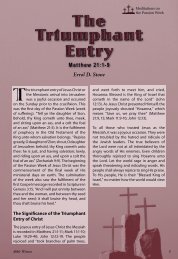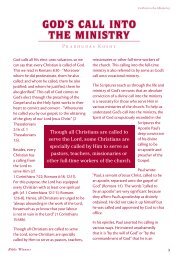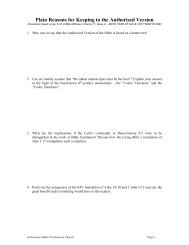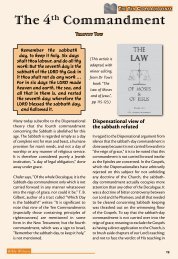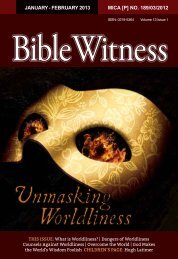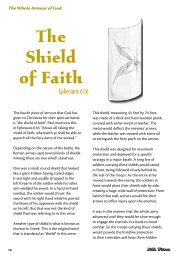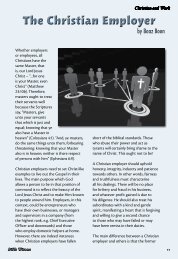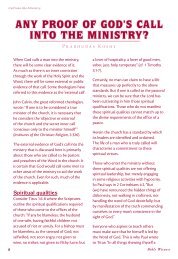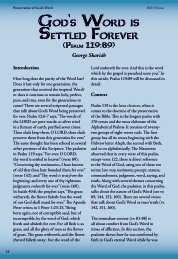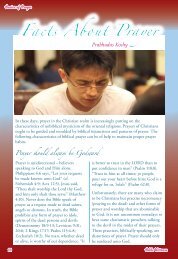Nurturing Of Children - Bible Witness
Nurturing Of Children - Bible Witness
Nurturing Of Children - Bible Witness
Create successful ePaper yourself
Turn your PDF publications into a flip-book with our unique Google optimized e-Paper software.
Editor<br />
Prabhudas Koshy<br />
Publishing & Circulation<br />
Co-ordinator<br />
Lok Kwok Wah<br />
Technical Editors<br />
Adrienne Foo, Carolyn Koshy, Jenny Lok,<br />
Lok Kwok Wah & Mah Lean Choo<br />
Cover Design<br />
Melissa Neo<br />
Layout<br />
Kenneth Wong<br />
Illustrations<br />
Sharon Ng<br />
Publisher<br />
<strong>Bible</strong> <strong>Witness</strong> Media Ministry of<br />
Gethsemane <strong>Bible</strong>-Presbyterian Church,<br />
Singapore<br />
Printer<br />
Chung Printing<br />
Contact Information<br />
By mail:<br />
<strong>Bible</strong> <strong>Witness</strong> Media Ministry<br />
510 Geylang Road, #02-06<br />
Singapore 389466<br />
Tel: (65) 6741-1910 Fax: (65) 6741-1016<br />
Web-site: www.biblewitness.com<br />
E-mail: editor@biblewitness.com<br />
CONTENTS<br />
3<br />
7<br />
8<br />
10<br />
14<br />
17<br />
19<br />
20<br />
23<br />
25<br />
27<br />
NURTURING OF CHILDREN<br />
<strong>Nurturing</strong> <strong>Children</strong> By the Word of God<br />
Family Talk from a Grandfather<br />
Parent-Child Relationship<br />
Biblical Counsels for the Upbringing of<br />
Our <strong>Children</strong><br />
Teaching Your <strong>Children</strong> Spiritual Truths<br />
Is the Rod of Correction Good and<br />
Necessary<br />
Teaching Your <strong>Children</strong> How to Love<br />
Protect Our <strong>Children</strong> from the Occult and<br />
Sorcery<br />
Avoid the Dangers of Television<br />
GOSPEL TRANSFORMS DRUG ADDICTS<br />
Activities of The Gethsemane Care<br />
Ministry<br />
CHILDREN’S PAGE<br />
<strong>Bible</strong> Trivia - Genesis 14 & 15<br />
Writers, other than the editor, are<br />
acknowledged in their respective articles.<br />
SUBSCRIPTION INFORMATION<br />
1 year’s subscription (6 issues) Singapore / Malaysia: S$14.00 International<br />
All rates inclusive of postage<br />
*Surface Mail: S$16.00<br />
*Air Mail: S$24.00 (Asia)<br />
S$30.00 (All Other Countries)<br />
International bank draft, money order or postal order drawn on a Singapore bank in Singapore dollars may be made<br />
payable to “<strong>Bible</strong> <strong>Witness</strong>.”<br />
LOVE-GIFT<br />
<strong>Bible</strong> <strong>Witness</strong> Media Ministry welcomes love-gifts from readers to meet the cost of publishing and distribution. The<br />
subscription rate is kept below the publishing cost in order to make the magazine affordable to our readers. The Ministry also<br />
sends the magazine free to churches in poorer countries. Hence your support is much needed and greatly appreciated.<br />
USE OF ARTICLES<br />
The articles may be freely used for non-commercial purposes, so long as they are quoted verbatim, and the writer as well as<br />
the source identified.
<strong>Bible</strong> <strong>Witness</strong><br />
<strong>Nurturing</strong> of <strong>Children</strong><br />
<strong>Nurturing</strong> <strong>Children</strong> By<br />
the Word of God<br />
Mah Chin Kwang<br />
Parents today invest much<br />
time and money in the care<br />
and nurture of their children.<br />
Besides the obvious aention to the<br />
basic needs of food, health and clothing,<br />
they are increasingly interested in their<br />
children’s development in their mental,<br />
social, moral and even spiritual wellbeing.<br />
Organizations and business<br />
entities are quick to notice this and<br />
therefore offer a variety of ways to help<br />
parents. The newspapers and family<br />
magazines list many organizations<br />
offering their professional services.<br />
Bookstores and libraries are<br />
filled with countless books and<br />
magazines on the subject of child<br />
care. In a recent exercise on the<br />
internet using a popular search<br />
engine, I found that more than 2<br />
million websites were registered<br />
when the words “nurturing<br />
children” were keyed in.<br />
is sad to note that parents in general<br />
and Christian parents in particular<br />
are ignorant of the Holy <strong>Bible</strong> as<br />
a resource for nurturing children.<br />
Sadder still to know that some who<br />
are aware, choose to ignore and even<br />
reject the wise teachings of Scripture.<br />
Perhaps some Christian parents find<br />
the <strong>Bible</strong>’s teaching irrelevant, while<br />
others find it unfashionable. Is it really<br />
How does the <strong>Bible</strong> compare as the<br />
basis for nurturing our children, and<br />
what wisdom does it have to offer<br />
With all these resources readily<br />
available, it is small wonder<br />
that parents turn to them as<br />
their foundation and basis for<br />
the nurturing of their precious<br />
brood. Cost also is an incidental<br />
consideration given the general<br />
affluence of society today. The<br />
belief that money invested on their<br />
children’s well-being is money<br />
well spent oentimes results in<br />
parents making great financial<br />
sacrifices for their children.<br />
In the light of this great interest<br />
in the well-being of children, it<br />
3
<strong>Nurturing</strong> of <strong>Children</strong> <strong>Bible</strong> <strong>Witness</strong><br />
To begin with, we need first to consider<br />
the author or the one behind these<br />
teachings. Any teaching is only as good,<br />
credible and reliable as the person who<br />
originates these concepts and teachings.<br />
We all know who the author of the Holy<br />
<strong>Bible</strong> is. 2 Timothy 3:16 reminds us that<br />
“All Scripture is given by inspiration of<br />
God, and is profitable for doctrine, for<br />
reproof, for correction, for instruction<br />
in righteousness.” Consider, too, this<br />
verse: “For the prophecy came not in old<br />
time by the will of man: but holy men<br />
of God spake as they were moved by<br />
the Holy Ghost” (2 Peter 1:21). The two<br />
verses clearly confirm that the Almighty<br />
God is the author of the <strong>Bible</strong>, though<br />
He used the agency of men to pen it.<br />
Consequently, God’s aributes of holiness,<br />
righteousness, immutability, grace,<br />
compassion and love are reflected and<br />
embodied in the teachings of the <strong>Bible</strong>.<br />
While obviously there are credible men<br />
who seek honestly to help nurture our<br />
young, there are others with questionable<br />
qualifications, life-styles, value systems,<br />
and motivations. Even the best works<br />
from the most credible of men pale when<br />
compared to the <strong>Bible</strong> which was given by<br />
inspiration of the Lord God. Indeed, there<br />
really is no scale that is able to measure<br />
the quality of the work of this Holy<br />
Author against that of puny man with<br />
all his human failures and infirmities.<br />
Secondly, because God is unchangeable,<br />
all the moral truths of the <strong>Bible</strong> are<br />
also unchangeable. They are not made<br />
irrelevant or diminished in scope by<br />
time, geographical seing, culture<br />
and mores. Biblical teachings are as<br />
relevant today as they were in the<br />
days of the prophets and apostles.<br />
For example, the moral exhortation<br />
for children to honour and obey their<br />
parents is as applicable in Singapore<br />
today as in countries where society is<br />
more permissive and egalitarian.<br />
We must have read of some secular<br />
experts who had to retract, change<br />
and fine-tune their theories in their<br />
particular areas of expertise to suit the<br />
changing times, life-styles and value<br />
systems prevailing in society. Populist<br />
pressure more oen than not results in<br />
secular teachers having to shi and to<br />
accommodate. Not so the <strong>Bible</strong>. The Holy<br />
<strong>Bible</strong> stands as a timeless immoveable<br />
beacon, beaming its truth in the bright<br />
of day or in the darkest night, upon<br />
a calm peaceful sea or in a turbulent<br />
storm. Like seafarers who trust the light<br />
of the beacon for their safety, we, as<br />
Christian parents and teachers, should<br />
rely on the <strong>Bible</strong> as the guiding light in<br />
the care and nurture of our children.<br />
The wisdom of biblical instructions<br />
through its direct commands, injunctions<br />
and warnings, together with lessons<br />
to be gleaned from the lives of biblical<br />
characters (both exemplary and<br />
bad) is overwhelming. Consider the<br />
following godly instructions that form a<br />
comprehensive and effective instructional<br />
guide on nurturing children:<br />
Need to teach children<br />
• Deuteronomy 6:7 “And thou shalt<br />
teach them diligently unto thy children,<br />
and shalt talk of them when thou<br />
siest in thine house, and when thou<br />
walkest by the way, and when thou<br />
liest down, and when thou risest up.”<br />
• Joshua 4:21-22 “And he spake unto<br />
the children of Israel, saying, When<br />
your children shall ask their fathers<br />
in time to come, saying, What mean<br />
these stones Then ye shall let your<br />
children know, saying, Israel came<br />
over this Jordan on dry land.”<br />
• Deuteronomy 11:19 “And ye<br />
shall teach them your children,<br />
4
<strong>Bible</strong> <strong>Witness</strong><br />
speaking of them when thou siest<br />
in thine house, and when thou<br />
walkest by the way, when thou liest<br />
down, and when thou risest up.”<br />
• Deuteronomy 32:46 “And he said<br />
unto them, Set your hearts unto all the<br />
words which I testify among you this day,<br />
which ye shall command your children to<br />
observe to do, all the words of this law.”<br />
• Proverbs 22:6 “Train up a child in<br />
the way he should go: and when he<br />
is old, he will not depart from it.”<br />
Teaching them the fear of the Lord<br />
• Psalm 34:11 “Come, ye children,<br />
hearken unto me: I will teach<br />
you the fear of the LORD.”<br />
• Deuteronomy 31:13 “And that<br />
their children, which have not<br />
known any thing, may hear, and<br />
learn to fear the LORD your God, as<br />
long as ye live in the land whither<br />
ye go over Jordan to possess it.”<br />
• Isaiah 54:13 “And all thy children<br />
shall be taught of the LORD; and great<br />
shall be the peace of thy children.”<br />
• Ephesians 6:4 “And, ye fathers,<br />
provoke not your children to wrath:<br />
but bring them up in the nurture<br />
and admonition of the Lord.”<br />
Correction and chastening<br />
encouraged<br />
• Proverbs 22:15 “Foolishness is bound<br />
in the heart of a child; but the rod of<br />
correction shall drive it far from him.”<br />
• Proverbs 23:13 “Withhold<br />
not correction from the child:<br />
for if thou beatest him with<br />
the rod, he shall not die.”<br />
• Proverbs 29:15 “The rod and reproof<br />
give wisdom: but a child le to himself<br />
bringeth his mother to shame.”<br />
• Hebrews 12:5 “And ye have forgoen<br />
the exhortation which speaketh unto<br />
you as unto children, My son, despise<br />
not thou the chastening of the Lord, nor<br />
faint when thou art rebuked of him.”<br />
<strong>Nurturing</strong> of <strong>Children</strong><br />
Obedience to parents<br />
• Ephesians 6:1 “<strong>Children</strong>, obey your<br />
parents in the Lord: for this is right.”<br />
• Colossians 3:20 “<strong>Children</strong>, obey<br />
your parents in all things: for this<br />
is well pleasing unto the Lord.”<br />
• Titus 1:6 “If any be blameless, the<br />
husband of one wife, having faithful<br />
children not accused of riot or unruly.”<br />
Accountability for their actions<br />
• Proverbs 20:11 “Even a child is<br />
known by his doings, whether his work<br />
be pure, and whether it be right.”<br />
• Ezekiel 18:20 “The soul that sinneth,<br />
it shall die. The son shall not bear the<br />
iniquity of the father, neither shall the<br />
father bear the iniquity of the son: the<br />
righteousness of the righteous shall<br />
be upon him, and the wickedness of<br />
the wicked shall be upon him.”<br />
Warning to children<br />
• Psalm 89:30-32 “If his children<br />
forsake my law, and walk not in my<br />
judgments; if they break my statutes,<br />
and keep not my commandments; then<br />
will I visit their transgression with the<br />
rod, and their iniquity with stripes.”<br />
• Proverbs 1:8 “My son, hear the<br />
instruction of thy father, and forsake<br />
not the law of thy mother.”<br />
• Proverbs 6:20 “My son, keep thy<br />
father’s commandment, and forsake<br />
not the law of thy mother.”<br />
• Proverbs 17:25 “A foolish<br />
son is a grief to his father, and<br />
bierness to her that bare him.”<br />
• Proverbs 19:13 “A foolish son is the<br />
calamity of his father: and the contentions<br />
of a wife are a continual dropping.”<br />
• 1 Chronicles 28:9 “And thou,<br />
Solomon my son, know thou the God<br />
of thy father, and serve him with a<br />
perfect heart and with a willing mind:<br />
for the LORD searcheth all hearts, and<br />
understandeth all the imaginations of<br />
the thoughts: if thou seek him, he will<br />
5
<strong>Nurturing</strong> of <strong>Children</strong> <strong>Bible</strong> <strong>Witness</strong><br />
be found of thee; but if thou forsake<br />
him, he will cast thee off for ever.”<br />
• Deuteronomy 21:18-21 “If a man have<br />
a stubborn and rebellious son, which will<br />
not obey the voice of his father, or the<br />
voice of his mother, and that, when they<br />
have chastened him, will not hearken<br />
unto them: then shall his father and his<br />
mother lay hold on him, and bring him<br />
out unto the elders of his city, and unto<br />
the gate of his place; and they shall say<br />
unto the elders of his city, This our son<br />
is stubborn and rebellious, he will not<br />
obey our voice; he is a gluon, and a<br />
drunkard. And all the men of his city<br />
shall stone him with stones, that he die:<br />
so shalt thou put evil away from among<br />
you; and all Israel shall hear, and fear.”<br />
<strong>Children</strong> are precious - not only to<br />
their parents, but also to God. While<br />
our Lord Jesus Christ was on earth, He<br />
demonstrated that He loved children<br />
and spent time with them. The <strong>Bible</strong><br />
recorded an occasion when His disciples<br />
unwiingly shooed away parents<br />
who brought their children to Him so<br />
that He might touch them. “He was<br />
much displeased, and said unto them,<br />
Suffer the lile children to come unto<br />
me, and forbid them not: for of such is<br />
the kingdom of God” (Mark 10:14).<br />
His love and care for children is clearly<br />
evident in His teachings in Mark 9:37<br />
“Whosoever shall receive one of such<br />
children in my name, receiveth me: and<br />
whosoever shall receive me, receiveth not<br />
me, but him that sent me”; Mahew 18:6<br />
“But whoso shall offend one of these lile<br />
ones which believe in me, it were beer<br />
for him that a millstone were hanged<br />
about his neck, and that he were drowned<br />
in the depth of the sea”; and Mahew<br />
18:10 “Take heed that ye despise not one<br />
of these lile ones; for I say unto you,<br />
That in heaven their angels do always<br />
behold the face of my Father which is in<br />
heaven.” We who are the followers of our<br />
Master need to live by His example. Just<br />
as He loved children, so must we all.<br />
“<strong>Children</strong> are an heritage of the LORD”<br />
(Psalm 127:3). God has given us, parents<br />
and teachers, a very blessed and joyful<br />
role in the caring and nurturing of<br />
children. The importance of this role is<br />
matched by the responsibility that we<br />
hold in ensuring that our children be<br />
nurtured well and uprightly. It therefore<br />
behoves us to give them the very best and<br />
wisest lessons of life. And that can only<br />
come from God’s Word, the Holy <strong>Bible</strong>.<br />
6
<strong>Bible</strong> <strong>Witness</strong><br />
Family Talk<br />
from a<br />
Grandfather<br />
(Extracted from “Recipes for Living a Happy Life”)<br />
Do you know that when you have<br />
a child, it brings joy not only to<br />
the father and mother but also<br />
to the grandfather and grandmother So<br />
I declared in my family, “I’m May Ann’s<br />
best friend.” The whole family is full of<br />
joy. Day and night they go and look at<br />
the lile baby. All the more when the<br />
husband and wife<br />
quarrel, and if they<br />
look at the baby,<br />
they will be bound<br />
together again.<br />
Now, in our present<br />
economy, perhaps<br />
it is necessary for<br />
us to hold on until<br />
such a time we can<br />
afford to have a<br />
baby. You know best<br />
between yourselves<br />
and the Lord. But it<br />
is most important<br />
for us to put family<br />
life first, with the<br />
baby in the centre.<br />
Now, if I say this,<br />
some wives may not<br />
vote for me to be<br />
pastor next time!<br />
Timothy Tow<br />
In my days, I was<br />
not drawing a big salary and when we got<br />
married, my wife had to take care of the<br />
baby. When the children grew older, she<br />
worked as a midwife and she continued<br />
<strong>Nurturing</strong> of <strong>Children</strong><br />
for some years, until the Lord took her.<br />
Now, I read somewhere that a wife,<br />
by doing the family chores, is actually<br />
earning $1,700 a month, especially when<br />
the baby is young. I would think it is a<br />
beer idea for the wife to cease working<br />
outside and put all her energy to bringing<br />
up her child. The amount of <strong>Bible</strong>,<br />
gospel, hymns and songs and words of<br />
God that you impart to the lile child is<br />
something that a maid can never give.<br />
As I grew up, I heard many songs that<br />
seemed very familiar to me. It is from<br />
the “tape-recording” in the baby’s mind.<br />
When I was young, my mother sang all<br />
those hymns to me, so hearing them<br />
when I grew up was like seeing old<br />
friends! That’s why I say for someone to<br />
be born in a Christian family where the<br />
Lord is paramount,<br />
is to be born into<br />
heaven on earth.<br />
See the teaching,<br />
for example, of<br />
Timothy under<br />
Eunice and<br />
Lois, that from<br />
a small child he<br />
had known the<br />
Holy Scriptures<br />
which were able<br />
to make him wise<br />
unto salvation!<br />
Let me counsel<br />
young couples<br />
intending to marry:<br />
Please don’t be a<br />
dink, d-i-n-k —<br />
double-income-nokids.<br />
This is now<br />
an accepted word<br />
in the American<br />
language. He<br />
is a dink, that means he has a wife<br />
who also earns an income but they<br />
don’t want to have any children.<br />
7
<strong>Nurturing</strong> of <strong>Children</strong> <strong>Bible</strong> <strong>Witness</strong><br />
Parent-Child Relationship<br />
Life becomes a bewildering<br />
labyrinth when we ignore<br />
God’s truth and seek earthly<br />
wisdom. Nowhere is this more clearly<br />
illustrated than in the family. Why<br />
the warfare between parent and<br />
child Why is parenthood so difficult,<br />
dreaded, and feared Why is growing<br />
up so painful and distressing<br />
When are we going to learn that God’s<br />
creatures can only live successfully in<br />
His world by following His ways If God<br />
is all-wise and all-holy, His Word must<br />
be both good (because it is the fruit of<br />
unblemished holiness) and best (because<br />
it is the fruit of infinite wisdom). If this is<br />
so (and it is) why do we persist in seeking<br />
other ways<br />
God’s counsel<br />
concerning every<br />
Christian family<br />
is recorded in<br />
Ephesians 6:1-4.<br />
“<strong>Children</strong>, obey<br />
your parents in<br />
the Lord: for this is<br />
right. Honour thy<br />
father and mother;<br />
(which is the first<br />
commandment<br />
with promise;)<br />
that it may be well<br />
with thee, and<br />
thou mayest live<br />
long on the earth.<br />
And, ye fathers,<br />
provoke not your<br />
children to wrath:<br />
but bring them<br />
up in the nurture<br />
and admonition<br />
of the Lord.”<br />
These words of counsel may not appear<br />
“scholarly”. They don’t come from a<br />
densely printed, heavily footnoted,<br />
professional treatise. You won’t find<br />
these things in the latest psychology<br />
journals. But these simple directives<br />
are God’s formula for a happy home.<br />
<strong>Children</strong> Must Obey<br />
How clear and simple are His directions<br />
to parents and children (Ephesians 6:1-4).<br />
<strong>Children</strong> are to obey. Parents have been<br />
given authority by God to command<br />
their children. Indeed, parents hold the<br />
position of God’s representatives to their<br />
children. For this reason, children are<br />
commanded to honour their parents even<br />
as they honour the Lord<br />
Himself (Leviticus 19:3;<br />
Hebrews 12:9). In this<br />
anti-authoritarian age, we<br />
need to remember this.<br />
It is not unreasonable to<br />
expect obedience from<br />
lile ones (or our “big,<br />
teenage ones” for that<br />
maer). The authority<br />
they submit to is God’s<br />
and His authority ought<br />
always to be honoured.<br />
This submission<br />
required of children is<br />
not unlimited, however.<br />
No parent has the right<br />
to command anything<br />
contrary to Scripture.<br />
<strong>Children</strong> are required to<br />
obey but only in the Lord.<br />
<strong>Children</strong> are to obey, “for<br />
this is right.” Paul does<br />
not mention the many<br />
8
<strong>Bible</strong> <strong>Witness</strong><br />
benefits that come to obedient children<br />
nor does he mention the benefits parents<br />
derive from obedient children. He simply<br />
points to the ultimate reason we are to<br />
do anything – because it is right. It is<br />
God’s will that you honour your parents.<br />
Yes, great blessings come to you (and<br />
to them) when you honour them, but<br />
the primary reason you must do this is<br />
that God requires it. Following these,<br />
children will receive the promised<br />
blessings of the covenant (“it may be<br />
well with thee, and thou mayest live<br />
long on the earth”). Submiing to your<br />
parents won’t injure you. They are God’s<br />
protectors set over you for your good.<br />
Parents Should Not Provoke<br />
<strong>Children</strong> to Wrath<br />
What about the responsibilities of<br />
parents Mutual privileges and<br />
responsibilities mark the family<br />
relationship. If one party is bound to<br />
submit to the authority of another, it is<br />
imperative that the other party exercises<br />
that authority in lawful and honourable<br />
ways. Thus Paul tells fathers, “Provoke<br />
not your children to wrath.” This<br />
admonition is also applicable to mothers.<br />
This does not mean that we will never<br />
make our children angry. Being sinners,<br />
children sometimes get angry even<br />
when we exercise authority properly.<br />
The point is that fathers are not to<br />
provoke anger by ungodly rule over their<br />
children, e.g., when we give unscriptural<br />
commands, when we make unjust<br />
demands, when we have unreasonable<br />
expectations of our children, when<br />
our chastisements are too harsh or too<br />
lax, when our rule is administered<br />
hypocritically or inconsistently.<br />
If our children are provoked<br />
to anger by faithful rule, they<br />
sin. If they are provoked by our<br />
inconsistent, unreasonable, or<br />
ungodly rule, we have sinned.<br />
<strong>Nurturing</strong> of <strong>Children</strong><br />
We must not provoke our children but<br />
rather “bring them up in the nurture<br />
and admonition of the Lord.” We must<br />
rule over our children as God rules over<br />
us. How does God rule us He nurtures<br />
and admonishes us. We must therefore<br />
instruct, encourage, and lead as well as<br />
chasten, rebuke, and correct our children.<br />
We must set before them the truth of<br />
God and train them to walk in it.<br />
Obeying this, parents will enjoy the<br />
blessed fruits of children who love and<br />
honour them and even more importantly,<br />
love and honour the God who made<br />
them. “Correct thy son, and he shall give<br />
thee rest; yea, he shall give delight unto<br />
thy soul” (Proverbs 29:17). You don’t have<br />
to worry about warping your children<br />
if you spank them as God commands.<br />
You don’t have to fear inhibiting their<br />
creativity by insisting upon obedience<br />
to your word. You need not be afraid of<br />
wounding their “self-esteem” by saying<br />
“No!” If God commands us to do these<br />
things, we know they can be safely done.<br />
Conclusion<br />
<strong>Children</strong> are blessings, not burdens<br />
(Psalm 127:3). <strong>Children</strong> should value<br />
and honour, not despise their parents<br />
(Proverbs 17:6). Why continue domestic<br />
warfare Discard the nasty words!<br />
Stop the bribery, manipulation, and<br />
deception! Begin, by God’s grace, to<br />
do what He says. Take time to pray<br />
for the peace of your home. Then and<br />
only then will you dwell safely and<br />
securely and enjoy God’s peace.<br />
9
<strong>Nurturing</strong> of <strong>Children</strong> <strong>Bible</strong> <strong>Witness</strong><br />
Biblical Counsels for the<br />
Upbringing of Our <strong>Children</strong><br />
✎ Give thanks to<br />
God always for the<br />
children He has<br />
blessed you with!<br />
When God gives us<br />
children, we must view<br />
them as God’s gis<br />
and thank God for the<br />
opportunity to have<br />
them. “He maketh<br />
the barren woman to<br />
keep house, and to<br />
be a joyful mother of<br />
children. Praise ye<br />
the LORD” (Psalm<br />
113:9). “<strong>Children</strong> are<br />
an heritage of the<br />
LORD: and the fruit<br />
of the womb is his<br />
reward” (Psalm 127:3).<br />
✎ Begin praying with<br />
your children from<br />
birth. You will be<br />
amazed how quickly<br />
they begin to pray<br />
with you! “Come,<br />
ye children, hearken<br />
unto me: I will teach<br />
you the fear of the<br />
LORD” (Psalm 34:11).<br />
✎ Help them to know<br />
Jesus as early as<br />
possible. “But Jesus<br />
said, Suffer lile<br />
children, and forbid<br />
them not, to come unto<br />
me: for of such is the<br />
kingdom of heaven”<br />
(Mahew 19:14).<br />
✎ Read the <strong>Bible</strong> to your<br />
children. Sharing the<br />
<strong>Bible</strong>, during a family<br />
time together, can be<br />
a wonderful<br />
spiritual<br />
experience. A<br />
daily family<br />
worship/<br />
devotion is<br />
an excellent<br />
opportunity<br />
to share the<br />
Word with<br />
the children.<br />
“And these<br />
words, which I<br />
command thee<br />
this day, shall<br />
be in thine heart: and<br />
thou shalt teach them<br />
diligently unto thy<br />
children, and shalt talk<br />
of them when thou<br />
siest in thine house,<br />
and when thou walkest<br />
by the way, and when<br />
thou liest down, and<br />
when thou risest<br />
up” (Deuteronomy<br />
6:6-7). “We will not<br />
hide them from their<br />
children, shewing<br />
to the generation to<br />
come the praises of<br />
the LORD, and his<br />
strength, and his<br />
wonderful works that<br />
he hath done. For he<br />
established a testimony<br />
in Jacob, and appointed<br />
a law in Israel, which<br />
he commanded our<br />
fathers, that they<br />
should make them<br />
known to their<br />
children: that the<br />
generation to come<br />
might know them,<br />
even the children<br />
which should be born;<br />
who should arise and<br />
declare them to their<br />
children: that they<br />
might set their hope in<br />
God, and not forget the<br />
works of God, but keep<br />
his commandments”<br />
(Psalm 78:4-7).<br />
✎ Have patience with<br />
your children. Listen<br />
to them; don’t just<br />
hear what they are<br />
saying. Give them your<br />
aention and observe<br />
10
<strong>Bible</strong> <strong>Witness</strong><br />
them when they speak<br />
to you. Then you can<br />
know more about their<br />
problems, concerns<br />
and difficulties<br />
that you need to<br />
bring to the Lord in<br />
intercessory prayer for<br />
them. The Lord expects<br />
us to pity our children<br />
and know their<br />
infirmities. In fact, it<br />
is the same way that<br />
the Lord deals with<br />
us all. Psalm 103:13-14<br />
says, “Like as a father<br />
pitieth his children,<br />
so the LORD pitieth<br />
them that fear him.<br />
For he knoweth our<br />
frame; he remembereth<br />
that we are dust.”<br />
✎ Do everything<br />
possible to have Mum<br />
stay at home with<br />
the children. This<br />
is a great sacrifice<br />
for many women<br />
who have already<br />
established themselves<br />
in a career, or for<br />
families who have<br />
financial difficulty.<br />
God will provide, if<br />
you believe that He<br />
will make a way out<br />
of your problems. Tell<br />
the Lord your desire to<br />
obey His Word and ask<br />
Him for the provisions.<br />
As parents, there is<br />
no greater duty on this<br />
earth than raising our<br />
children in the Lord.<br />
The Scripture clearly<br />
teaches that the main<br />
job of a young mother<br />
is to be the manager<br />
of the house. Read the<br />
following: “That they<br />
may teach the young<br />
women to be sober, to<br />
love their husbands, to<br />
love their children, to be<br />
discreet, chaste, keepers<br />
at home, good, obedient<br />
to their own husbands,<br />
that the word of God<br />
be not blasphemed”<br />
(Titus 2:4-5). The<br />
words “keepers at<br />
home” is a translation<br />
of one Greek word<br />
(oikourgous) that<br />
means “homeworker.”<br />
A mother<br />
has so much to do at<br />
home in the rearing<br />
of her children and<br />
lovingly supporting<br />
her husband. So<br />
once again, the<br />
Scripture tells us, “I<br />
will therefore that<br />
the younger women<br />
marry, bear children,<br />
guide the house, give<br />
none occasion to the<br />
adversary to speak<br />
reproachfully” (1<br />
Timothy 5:14). Like<br />
the virtuous woman<br />
of Proverbs 31, may<br />
all Christian mothers<br />
learn to give top<br />
priority to the things<br />
at home that she may<br />
become a true blessing<br />
to her children and<br />
husband. According<br />
to God’s Word, she<br />
shall be praised – “Her<br />
children arise up,<br />
and call her blessed;<br />
<strong>Nurturing</strong> of <strong>Children</strong><br />
her husband also,<br />
and he praiseth her”<br />
(Proverbs 31:28).<br />
✎ Watch over your<br />
children diligently!<br />
Study your children!<br />
Know who they are,<br />
what they love, even<br />
the bad “bents” in<br />
them. Know where<br />
they are, whom they<br />
associate with, what<br />
they are watching<br />
on T.V., what sort of<br />
music they listen to,<br />
etc. Parents must get<br />
involved and stay<br />
involved. We have<br />
only a short period<br />
of time to raise our<br />
children. In that short<br />
period, let us strive to<br />
train them with good<br />
Christian moral values.<br />
Proverbs 20:11 tells us<br />
that when we observe<br />
a child closely, we<br />
can know his good<br />
and bad inclinations<br />
– “Even a child is<br />
known by his doings,<br />
whether his work be<br />
pure, and whether it<br />
be right.” According<br />
to each child’s habits<br />
and character, we must<br />
provide the necessary<br />
training. Proverbs 22:6<br />
says, “Train up a child<br />
in the way he should<br />
go: and when he is<br />
old, he will not depart<br />
from it.” Parents must<br />
try to eliminate any<br />
tendency towards bad<br />
behaviour. They must<br />
11
<strong>Nurturing</strong> of <strong>Children</strong> <strong>Bible</strong> <strong>Witness</strong><br />
also nurture talents<br />
and commendable<br />
behaviour that a<br />
child manifests.<br />
Give your children<br />
responsibilities early in<br />
life. <strong>Children</strong> trained<br />
in responsibility grow<br />
up to be self-reliant<br />
and dependable adults.<br />
✎ Keep control over the<br />
home! Your children<br />
must know who is<br />
in control. We must<br />
also teach them<br />
to respect proper<br />
authority. Ephesians<br />
6:1-4 – “<strong>Children</strong>, obey<br />
your parents in the<br />
Lord: for this is right.<br />
Honour thy father and<br />
mother; (which is the<br />
first commandment<br />
with promise;) that it<br />
may be well with thee,<br />
and thou mayest live<br />
long on the earth. And,<br />
ye fathers, provoke<br />
not your children to<br />
wrath: but bring them<br />
up in the nurture<br />
and admonition<br />
of the Lord.”<br />
✎ Love your children<br />
unceasingly! Hug<br />
them as much as<br />
possible, the infants<br />
love it a lot. Let<br />
them know just<br />
how much you love<br />
them! Mothers are<br />
commanded to love<br />
their children in Titus<br />
2:4, 5 – “That they<br />
may teach the young<br />
women to be sober, to<br />
love their husbands,<br />
to love their children,<br />
to be discreet, chaste,<br />
keepers at home,<br />
good, . . . .” Consider<br />
also the loving father<br />
in the parable of<br />
the “Prodigal Son”<br />
(Luke 15:11-24).<br />
✎ Commend them for<br />
good things they do. It<br />
delights a child a great<br />
deal and encourages<br />
him to do things that<br />
are right. Express your<br />
happiness to your<br />
children when they<br />
show good virtues<br />
and also when they<br />
progress in life. See<br />
the biblical paern of<br />
commending children<br />
when they make<br />
progress in life – “My<br />
son, if thine heart be<br />
wise, my heart shall<br />
rejoice, even mine.<br />
Yea, my reins shall<br />
rejoice, when thy lips<br />
speak right things. Let<br />
not thine heart envy<br />
sinners: but be thou in<br />
the fear of the LORD<br />
all the day long. For<br />
surely there is an end;<br />
and thine expectation<br />
shall not be cut off”<br />
(Proverbs 23:15-18).<br />
✎ Spend time enjoying<br />
your children. Get<br />
down to their level<br />
and see the world they<br />
see! It’s marvellous<br />
to bring out the child<br />
in Mum and Dad!<br />
Seek to have as much<br />
family time as you<br />
can. Have a “happy<br />
home”. Laugh together!<br />
Proper humour is good<br />
for the soul. Proverbs<br />
17:22 says, “A merry<br />
heart doeth good like a<br />
medicine: but a broken<br />
spirit drieth the bones.”<br />
✎ Discipline your<br />
children whenever<br />
necessary! We believe<br />
the biblical teaching<br />
that children must be<br />
lovingly guided with<br />
patience, humility,<br />
compassion, kindness<br />
and taught right from<br />
wrong as early as<br />
possible. Parents who<br />
do not consistently<br />
and fairly deal with<br />
the “wrongs” in a<br />
child’s life will most<br />
likely face many<br />
years of misery.<br />
Proverbs 19:18 –<br />
“Chasten thy son while<br />
there is hope, and let<br />
not thy soul spare for<br />
his crying.” Likewise,<br />
we read in Proverbs<br />
13:24, “He that spareth<br />
his rod hateth his<br />
son: but he that loveth<br />
him chasteneth<br />
him betimes.”<br />
✎ Keep your marriage<br />
together! <strong>Children</strong><br />
need parents who love<br />
each other! If you have<br />
grown up in a home<br />
where your parents did<br />
not get along, whether<br />
divorced or not, you<br />
12
<strong>Bible</strong> <strong>Witness</strong><br />
would have probably<br />
realised later in life<br />
the devastating results<br />
in your personal life.<br />
However, you can<br />
overcome this! Many<br />
are living proofs that<br />
it can be achieved.<br />
Parents must be<br />
role models to their<br />
children. What kind<br />
of marriage do you<br />
wish for your children<br />
Show them how to<br />
be good spouses<br />
and parents. Be the<br />
example of a good<br />
Christian marriage!<br />
Your conduct reflects<br />
to your children your<br />
walk with the Lord!<br />
What are you teaching<br />
your children by your<br />
example Remember,<br />
you are raising<br />
someone else’s future<br />
husband or wife, father<br />
or mother! Proverbs<br />
20:7 promises that “the<br />
just man walketh in his<br />
integrity: his children<br />
are blessed aer him.”<br />
✎ Serve the Lord with<br />
your children in<br />
a biblically sound<br />
church. Encourage<br />
them to worship the<br />
Lord and participate<br />
in church activities.<br />
The Lord hath<br />
commanded that<br />
parents should come<br />
with children before<br />
the Lord to worship.<br />
“Both young men, and<br />
maidens; old men,<br />
and children: let them<br />
praise the name of the<br />
LORD: for his name<br />
alone is excellent; his<br />
glory is above the earth<br />
and heaven” (Psalm<br />
148:12-13). “Gather<br />
the people together,<br />
men, and women,<br />
and children, and thy<br />
stranger that is within<br />
thy gates, that they<br />
may hear, and that<br />
they may learn, and<br />
fear the LORD your<br />
God, and observe<br />
to do all the words<br />
of this law: and that<br />
their children, which<br />
have not known any<br />
thing, may hear, and<br />
learn to fear the LORD<br />
your God, as long as<br />
ye live in the land<br />
<strong>Nurturing</strong> of <strong>Children</strong><br />
whither ye go over<br />
Jordan to possess it”<br />
(Deuteronomy 31:12-13).<br />
✎ If necessary, seek<br />
counsel from your<br />
pastors/elders that<br />
you may handle<br />
your challenges and<br />
struggles biblically.<br />
“Where no counsel<br />
is, the people fall: but<br />
in the multitude of<br />
counsellors there is<br />
safety” (Proverbs 11:14).<br />
✎ Moreover, make sure<br />
you do not neglect<br />
your own relationship<br />
with God. How can<br />
you lead your family,<br />
and children without<br />
it “Blessed is every<br />
one that feareth the<br />
LORD; that walketh<br />
in his ways. For thou<br />
shalt eat the labour of<br />
thine hands: happy<br />
shalt thou be, and it<br />
shall be well with thee.<br />
Thy wife shall be as<br />
a fruitful vine by the<br />
sides of thine house:<br />
thy children like olive<br />
plants round about thy<br />
table” (Psalm 128:1-3).<br />
“And these words, which I command thee this day,<br />
shall be in thine heart:<br />
and thou shalt teach them diligently unto thy children,<br />
and shalt talk of them when thou sittest in thine house,<br />
and when thou walkest by the way,<br />
and when thou liest down, and when thou risest up.”<br />
Deuteronomy 6:6-7<br />
13
<strong>Nurturing</strong> of <strong>Children</strong> <strong>Bible</strong> <strong>Witness</strong><br />
Teaching Your <strong>Children</strong><br />
Spiritual Truths<br />
“And these words, which<br />
I command thee this day,<br />
shall be in thine heart:<br />
and thou shalt teach<br />
them diligently unto thy<br />
children, and shalt talk<br />
of them when thou siest<br />
in thine house, and when<br />
thou walkest by the way,<br />
and when thou liest down,<br />
and when thou risest up”<br />
(Deuteronomy 6:6-7).<br />
Most Christian parents<br />
will admit to being<br />
somewhat intimidated by<br />
the weighty responsibility<br />
Scripture places on them.<br />
Our task is outlined in<br />
simple terms by verses<br />
like Proverbs 22:6 – “Train<br />
up a child in the way he<br />
should go: and when he<br />
is old, he will not depart<br />
from it” and Ephesians<br />
6:4 – “. . . bring them<br />
up in the nurture and<br />
admonition of the Lord.”<br />
Understanding our<br />
solemn duty as parents<br />
ought to provoke a certain<br />
amount of fear and<br />
trembling. But,<br />
it need not paralyse us.<br />
Teaching spiritual truths<br />
to children is a joy. No<br />
one is more receptive,<br />
more hungry to learn,<br />
or more trusting than a<br />
child. Chances are, you’ll<br />
never find more eager<br />
disciples than your own<br />
children. Don’t squander<br />
the opportunity.<br />
Let me suggest some<br />
practical principles to<br />
remember as you labour<br />
to communicate spiritual<br />
truths to your children.<br />
1. Understand that<br />
children can grasp<br />
the essence of<br />
almost any truth<br />
Is theology for the child<br />
or for the theologian<br />
“Theology” and “child”<br />
are incompatible in the<br />
minds of many Christians.<br />
In truth, we can teach<br />
theology to children,<br />
but it must be taught<br />
simply and clearly with<br />
the “milk” of the Word.<br />
<strong>Children</strong> who are in<br />
kindergarten and primary<br />
level can grasp the essence<br />
of biblical doctrines. We<br />
should not hold back<br />
teaching them the biblical<br />
doctrines because we<br />
think they aren’t ready.<br />
Though children may<br />
not fully understand<br />
some of the difficult<br />
spiritual concepts, they<br />
can grasp the essence<br />
of almost every truth.<br />
In fact, children are<br />
equipped to assimilate<br />
spiritual truths. That’s<br />
why Jesus called the adults<br />
to exercise childlike faith:<br />
“Whosoever shall not<br />
receive the kingdom of<br />
God as a lile child, he<br />
shall not enter therein”<br />
(Mark 10:15). What<br />
makes a child’s faith<br />
more outstanding than<br />
an adult’s It is simply<br />
that children refuse to<br />
be troubled by what they<br />
cannot understand.<br />
How many of us<br />
understand the concepts<br />
of infinity, eternity,<br />
or omnipotence any<br />
beer than we did as<br />
children We may speak<br />
of those ideas with more<br />
sophisticated terminology<br />
now, but our finite minds<br />
still cannot grasp the<br />
complete reality. Don’t<br />
be afraid to admit that<br />
to your children. Even<br />
David wrote about God’s<br />
eternal aributes that<br />
“such knowledge is too<br />
wonderful for me; it<br />
is high, I cannot aain<br />
unto it” (Psalm 139:6).<br />
14
<strong>Bible</strong> <strong>Witness</strong><br />
During our daily family<br />
devotions, my children<br />
have asked me questions<br />
about the spiritual truths<br />
that I explained from our<br />
reading. I recall my eldest<br />
son, Cornelius, as a sevenyear-old,<br />
wondering about<br />
my teaching on God’s<br />
omnipresence: “You mean,<br />
when I am in school, God<br />
is with me there and also<br />
with mummy in the house<br />
and also with daddy in<br />
FEBC!” My answer to him<br />
was “Yes, you’re right.<br />
God can be everywhere<br />
at the same time. It is too<br />
amazing for daddy to<br />
explain how God can be<br />
everywhere. However, we<br />
know from the <strong>Bible</strong> that<br />
though we can’t take care<br />
of one another when we<br />
are at different places, our<br />
Lord is able to look aer<br />
us.” My son’s reply was,<br />
“O, So good! God can be<br />
with us though we are<br />
not together.” Such is the<br />
response of a child’s faith<br />
to a solemn truth that<br />
is difficult to explain.<br />
Even toddlers can be<br />
taught the truths in a<br />
simple manner. Again I<br />
recall teaching my then<br />
four-year-old, Andronicus,<br />
and two-and-a-half-yearold,<br />
Dorcas, the Gospel<br />
truths in simple question<br />
and answer form. When I<br />
ask them, “What did Jesus<br />
do to save us”, they are<br />
able to answer, “Jesus died<br />
on the cross for our sins.”<br />
God’s truth is for everyone,<br />
but we must make it<br />
applicable to children and<br />
their changing needs. We<br />
should also use the best<br />
methods for each age level.<br />
2. Avoid unexplained<br />
symbolism<br />
Oen adults mistakenly<br />
believe that an allegory<br />
or figure of speech<br />
will clarify some great<br />
truths. With children,<br />
if the symbolism is not<br />
properly explained, oen,<br />
it only obscures the truth.<br />
Most young children<br />
can grasp the truths<br />
sooner than they can<br />
understand the metaphor.<br />
Nothing is wrong with<br />
using symbolism or<br />
figurative language<br />
to illustrate truths to<br />
children. Many excellent<br />
children’s stories<br />
demonstrate how effective<br />
the use of allegory can<br />
be. But all the symbolism<br />
must be carefully<br />
explained. Younger<br />
children, especially,<br />
do not have the ability<br />
to interpret figurative<br />
language independently.<br />
3. Clearly separate<br />
reality from fantasy<br />
<strong>Children</strong> today are<br />
bombarded with fantasy<br />
and make-believe.<br />
Saturday-morning<br />
television, super-heroes,<br />
and fantasy toys have all<br />
reached unprecedented<br />
levels of popularity.<br />
<strong>Nurturing</strong> of <strong>Children</strong><br />
Even Sunday school<br />
materials contain huge<br />
doses of fantasy. Some of<br />
them include stories of<br />
personified forest animals<br />
and other imaginary<br />
creatures. There’s nothing<br />
necessarily wrong with<br />
that approach. Fantasy<br />
can be a legitimate<br />
and valuable tool for<br />
teaching children.<br />
But don’t neglect to draw<br />
the line clearly between<br />
what is reality and what<br />
is fantasy. For example,<br />
don’t let them think that<br />
the story of David and<br />
Goliath is like the tale<br />
about Ronald Raccoon.<br />
Make sure your kids<br />
know which story is<br />
make-believe and which<br />
one is actual history.<br />
4. Find out what your<br />
children are thinking<br />
concerning the lesson<br />
Debrief your kids aer<br />
your family devotion<br />
or Sunday school. It’s<br />
great fun, and you’ll<br />
find out exactly which<br />
truths they are learning<br />
and which ones are<br />
going over their heads.<br />
This will enable us to<br />
immediately correct<br />
them if they are wrong,<br />
or plan to teach them<br />
again at another time<br />
to make it clearer and<br />
understandable. It will<br />
also help us to affirm<br />
once again if they have<br />
understood the truth, and<br />
commend and encourage<br />
15
<strong>Nurturing</strong> of <strong>Children</strong> <strong>Bible</strong> <strong>Witness</strong><br />
them to live out what<br />
they have learned.<br />
5. Don’t expect them<br />
to understand the<br />
lesson the first time<br />
<strong>Children</strong> rarely get the<br />
whole message right<br />
the first time. That’s<br />
why the best Sunday<br />
school curriculum<br />
has a lot of built-in<br />
repetitions and reviews.<br />
I oen ask my children,<br />
when we are travelling<br />
back from the church<br />
aer the worship or when<br />
we get home, about the<br />
lessons they have learned<br />
in the Sunday school.<br />
Though they are able to<br />
tell me the topic/story<br />
they learned, they oen<br />
do forget some facts<br />
and details of the story.<br />
Sometimes they add the<br />
details from another story<br />
that they learned before.<br />
It is important that we<br />
revise the lesson with<br />
the children. We must be<br />
diligent in bringing back<br />
the truths of God’s Word<br />
into the minds of the<br />
children. Deuteronomy<br />
6:6-7 records God’s charge<br />
to the entire Jewish nation:<br />
“And these words, which<br />
I command thee this day,<br />
shall be in thine heart:<br />
and thou shalt teach<br />
them diligently unto thy<br />
children, and shalt talk<br />
of them when thou siest<br />
in thine house, and when<br />
thou walkest by the way,<br />
and when thou liest down,<br />
and when thou risest up.”<br />
The principle still applies.<br />
Teaching our children<br />
spiritual truths is a neverending,<br />
non-stop duty.<br />
But it is also a tremendous<br />
privilege and great joy.<br />
Parents, you are your<br />
child’s principle spiritual<br />
guide. Don’t back away<br />
from that role. Don’t<br />
allow yourself to be<br />
intimidated or frustrated<br />
into abdicating this<br />
responsibility. It is the best<br />
thing about being a parent.<br />
6. Teach children how<br />
to practise the truth<br />
Too oen parents and<br />
teachers associate learning<br />
with head knowledge.<br />
The child has “learned”<br />
something when he can<br />
repeat it. But that does not<br />
fulfil the child’s needs for<br />
daily living. It is a start,<br />
but it is not enough.<br />
There are four steps<br />
necessary for the effective<br />
learning of truths. Head<br />
knowledge is the first one.<br />
Knowing is a necessary<br />
step, for one must see<br />
clearly what the <strong>Bible</strong><br />
truth is or says before<br />
he can understand it.<br />
The second step is<br />
understanding what<br />
that <strong>Bible</strong> truth means.<br />
It is not possible to move<br />
on to the next steps<br />
in learning until the<br />
learner first understands<br />
what he or she is trying<br />
to put into life.<br />
The third step is applying.<br />
In applying the <strong>Bible</strong> truth,<br />
the learner sees clearly<br />
what the truth means<br />
to him. The learner not<br />
only understands the<br />
meaning of the truth,<br />
but also that meaning in<br />
relation to his own life.<br />
The fourth step is<br />
practising. When a child<br />
learns what the truth is,<br />
then what it means, and<br />
then what it means to him<br />
or her, it is time to put<br />
it into practice in life.<br />
When someone wants to<br />
make <strong>Bible</strong> truths vital to a<br />
child, it is essential to help<br />
the child to incorporate<br />
the truths into his life.<br />
The practice of truth is the<br />
culmination of teaching.<br />
“Only take heed to<br />
thyself, and keep thy<br />
soul diligently, lest thou<br />
forget the things which<br />
thine eyes have seen, and<br />
lest they depart from thy<br />
heart all the days of thy<br />
life: but teach them thy<br />
sons, and thy sons’ sons”<br />
(Deuteronomy 4:9).<br />
16
<strong>Bible</strong> <strong>Witness</strong><br />
Is the Rod of<br />
Correction<br />
Good and<br />
Necessary<br />
Modern Psychologists Teach<br />
Against Rod of Correction<br />
One issue that is sure to spark a heated<br />
debate among parents of our time is<br />
spanking children to discipline them.<br />
Is spanking your child an effective<br />
means of disciplining, or do we set<br />
aside that time-honoured practice and<br />
let modern philosophy guide us<br />
The growing trend regarding children<br />
and discipline is that of leniency and<br />
reason. We have become a society which<br />
is afraid to set limits and reprimand<br />
when necessary, due to the alarming<br />
rise in child abuse and neglect. Many<br />
child psychologists are now teaching<br />
that a child must never be spanked.<br />
The suggested remedy is to take away<br />
privileges and reason with the child until<br />
he can understand the error of his ways.<br />
On the surface, this may sound like a<br />
reasonable solution, but<br />
when applied to reality,<br />
it does not work.<br />
In my own parental<br />
experience, time and time<br />
again I have observed that<br />
reasoning alone will not<br />
help my children to be<br />
free from misbehaving.<br />
How many times have<br />
<strong>Nurturing</strong> of <strong>Children</strong><br />
we all witnessed red-faced parents<br />
desperately pleading with their whiny,<br />
uncontrollable youngster to behave<br />
When a child is given freedom to control<br />
his decisions and mannerism, words<br />
and threats mean absolutely nothing.<br />
The Unrivalled Wisdom of God<br />
Advises Rod of Correction<br />
The <strong>Bible</strong>, which is the divinely-inspired<br />
Word of God and an infallible source<br />
of vast wisdom concerning our day-today<br />
life, supports spanking as a good<br />
and effective means of discipline.<br />
A firm swat on the thigh with a rod,<br />
administered with love, firmness and<br />
good counsel, is highly encouraged in<br />
the <strong>Bible</strong>. It is necessary to prevent the<br />
child from acting foolishly according<br />
to the sinful passions of his heart.<br />
“Foolishness is bound in the heart of<br />
a child; but the rod of correction shall<br />
drive it far from him” (Proverbs 22:15).<br />
In fact, the Scripture tells us that God’s<br />
chastisements of a believer are like the<br />
correction and chastening of a father.<br />
“My son, despise not the chastening<br />
of the LORD; neither be weary of his<br />
correction: for whom the LORD loveth<br />
he correcteth; even as a father the son in<br />
whom he delighteth” (Proverbs 3:11-12).<br />
Divine love does not permit rebellion,<br />
disobedience and bad behaviour. So<br />
every Christian parent, who<br />
wants holy habits in his<br />
children, must lovingly apply<br />
discipline. The Scripture leaves<br />
no room for doubt when it says<br />
that every parent who desires<br />
to love and protect the soul<br />
of his child from peril should<br />
apply the rod of correction.<br />
“He that spareth his rod hateth<br />
his son: but he that loveth<br />
17
<strong>Nurturing</strong> of <strong>Children</strong> <strong>Bible</strong> <strong>Witness</strong><br />
him chasteneth<br />
him betimes”<br />
(Proverbs 13:24).<br />
The “rod,” a thin<br />
tree branch, is<br />
an acceptable<br />
tool for<br />
administering<br />
discipline<br />
firmly and<br />
lovingly when a child refuses to accept<br />
the authority and instruction of the<br />
parent. “Withhold not correction from<br />
the child: for if thou beatest him with the<br />
rod, he shall not die” (Proverbs 23:13).<br />
A carefully administered rod will not<br />
threaten the life of a child. Beating a<br />
child carefully and properly in order to<br />
correct his folly and misdeeds is not child<br />
abuse, but child nurture. “Thou shalt<br />
beat him with the rod, and shalt deliver<br />
his soul from hell” (Proverbs 23:14).<br />
It should not be administered out of<br />
uncontrolled anger, frustration or<br />
vengeance. In such times of uncontrolled<br />
emotions, our words and actions will<br />
not manifest acceptable and proper<br />
virtues. Moreover, it will communicate<br />
wrong impressions about our feelings<br />
towards our children. It will also be a<br />
bad example for the children. They in<br />
turn may behave with uncontrolled and<br />
violent anger towards their siblings and<br />
friends in times of unhappiness and<br />
frustration. Let us take heed to what the<br />
Apostle Paul has wrien in Ephesians<br />
6:4 – “And, ye fathers, provoke not your<br />
children to wrath: but bring them up in<br />
the nurture and admonition of the Lord.”<br />
Spanking is not to be viewed as a<br />
means to vent our anger on the child<br />
in its violent fury. Such a mentality<br />
will result in the abuse of this effective<br />
and necessary method of correction.<br />
Let us not forget the purpose<br />
of applying the rod. The<br />
single purpose is to correct<br />
the error of the child. So<br />
when we apply the rod, the<br />
message of correction must be<br />
communicated. In Proverbs<br />
29:15, we are told, “The rod<br />
and reproof give wisdom: but<br />
a child le to himself bringeth<br />
his mother to shame.”<br />
In other words, we must clearly tell the<br />
child what wrong he has done and how<br />
it should be corrected. Beating a child<br />
without sensible words of correction<br />
is not encouraged in the <strong>Bible</strong>. We are<br />
clearly taught that we must reprove as<br />
we apply the rod. In this way, we will<br />
also be able to refrain from senseless<br />
beating out of an enraged heart.<br />
Our mind must be focused on the<br />
child’s correction more than our own<br />
feelings of hurt and unhappiness.<br />
“Correct thy son, and he shall give thee<br />
rest; yea, he shall give delight unto thy<br />
soul” (Proverbs 29:17). No child is perfect.<br />
But they must be instructed, guided and<br />
corrected as they grow up that they may<br />
become godly individuals who bring joy<br />
and blessings to those around them.<br />
The rod of correction in the discipline of<br />
children is an absolute necessity. It is so<br />
important that the <strong>Bible</strong> says, “Chasten<br />
thy son while there is hope, and let not<br />
thy soul spare for his crying” (Proverbs<br />
19:18). <strong>Children</strong> will naturally try every<br />
means to escape the rod, even by crying<br />
loudly and shedding tears profusely.<br />
But none of these should deter a godly<br />
parent, who wishes the best for the<br />
child, from applying the rod. If that is<br />
the biblical counsel, how much more we<br />
should ignore those who shed “tears”<br />
and teach against the biblical wisdom<br />
of beating an errant child with a rod!<br />
18
<strong>Bible</strong> <strong>Witness</strong><br />
Teaching<br />
Your <strong>Children</strong><br />
How to Love<br />
“And, ye fathers, provoke not your<br />
children to wrath: but bring them up in<br />
the nurture and admonition of the Lord”<br />
(Ephesians 6:4).<br />
“But we were gentle among you, even<br />
as a nurse cherisheth her children”<br />
(1 Thessalonians 2:7).<br />
If we want our children to be kind and<br />
compassionate to others, the best way to<br />
help them to be able to do so is to teach<br />
them through the example of our own<br />
loving hearts and aitudes. Here are<br />
some concrete things we, as parents, can<br />
do to help our children learn to love.<br />
Love for Family<br />
✎ Create meaningful times together.<br />
Between school, church, friends,<br />
work, sports and numerous other<br />
activities, children can easily go for<br />
weeks without having so much as a<br />
prolonged conversation with mum,<br />
dad, or their siblings. If we want our<br />
children to love each other, we must<br />
find creative, meaningful times just<br />
to be together. A weekly “family<br />
night” especially with the TV off is<br />
a good step in the right direction.<br />
✎ Teach them to pray for one<br />
another. As you pray with your<br />
children, remind them to pray<br />
specially for each family member.<br />
In our time of prayer throughout the<br />
day, never forget to mention each<br />
child and parent by name, thanking<br />
<strong>Nurturing</strong> of <strong>Children</strong><br />
God for them and asking Him to<br />
guide them. Cultivate this habit<br />
in the children and it will become<br />
a natural part of their prayers.<br />
Love for Others<br />
✎ Talk positively about your friends.<br />
We all get angry with our friends and<br />
associates from time to time, and it is<br />
tempting to “unload” our resentment<br />
at home. But if we want our children<br />
to develop a genuine love for others,<br />
we, parents, need to guard our<br />
tongues from “harmless” gossips.<br />
✎ Reach out to those in need. <strong>Children</strong><br />
can be taught to help others in need.<br />
Bring your children along during<br />
your visitation to the sick and needy.<br />
If your children are going to learn<br />
to love and serve others, they must<br />
see the willingness and compassion<br />
in the lives of their parents.<br />
Love for God<br />
✎ Talk about God in the home. Home<br />
life brings many possibilities each<br />
day to recognise God’s wonderful<br />
love and grace. Every day, talk to<br />
your children about all the good<br />
things God has done for you and your<br />
family. Thank and praise God with<br />
your words and actions, and your<br />
children will learn to do the same.<br />
✎ Keep family prayer time. Having<br />
family prayer time not only reminds<br />
our children how important it is<br />
to pray, but also bring the joy of<br />
contributing to the prayer time by<br />
sharing and praying for their friends<br />
and themselves. They will get a<br />
clear picture of what it means to<br />
truly love others by remembering<br />
them before God in prayer.<br />
19
<strong>Nurturing</strong> of <strong>Children</strong> <strong>Bible</strong> <strong>Witness</strong><br />
Protect Our <strong>Children</strong> from<br />
the Occult and Sorcery<br />
(An article wrien to caution Christians when the Harry Poer books first hit the stand and<br />
now published due to the recent surge of interest in the latest release.)<br />
Harry Poer, Sorcery and Fantasy<br />
In recent months, a skinny, darkhaired<br />
orphan with a lightning-bolt<br />
scar on his forehead has taken over<br />
the New York Times bestseller list. The<br />
boy, Harry Poer, is the invention of<br />
British writer, J. K. Rowling, who has<br />
made publishing history by grabbing<br />
the top three spots on the bestseller<br />
list with her children’s books: Harry<br />
Poer and the Sorcerer’s Stone, Harry<br />
Poer and the Chamber of Secrets,<br />
and Harry Poer and the Prisoner of<br />
Azkaban. More than 35 million copies<br />
of the first three books are said to be<br />
sold around the world. These books are<br />
immensely popular in Singapore also.<br />
The big question is whether Harry’s<br />
world is a good one for the intended 8- to<br />
12-year-old reader. The American Library<br />
Association reports serious challenges<br />
to the use of the books in schools.<br />
Some parents have opposed<br />
the introduction of the books to<br />
schools by saying that “the books<br />
have a serious tone of death, hate,<br />
lack of respect, and sheer evil.”<br />
One educator comments: “ . . . Harry<br />
interacts with many fascinating<br />
characters in a series of magical<br />
adventures. The books, oen<br />
compared to those of Roald Dahl, are<br />
suspenseful and humorous, but the<br />
second and third ones are increasingly<br />
dark, and maybe the comparison<br />
should be to the tangled terrain and<br />
psychology of Batman movies.”<br />
The Scripture exhorts us, “Abhor<br />
that which is evil; cleave to that<br />
which is good” (Romans 12:9).<br />
<strong>Children</strong>’s literature sensation Harry<br />
Poer is increasingly descending into<br />
darkness. It raises concerns of parents<br />
and school boards around the world.<br />
Moral ambiguity and alienation of youths<br />
are strong themes in the series, which are<br />
wrongly marketed as harmless fantasy.<br />
Real Sorcery and Witchcra<br />
in Harry Poer<br />
Harry Poer is a boy who aends the<br />
Hogwarts School of Witchcra and<br />
Wizardry, and what is really being<br />
described in the book is sorcery. Sorcery<br />
and witchcra in some cultures are the<br />
same thing. The same Hebrew word<br />
in the Old Testament is translated as<br />
both “witchcra,” and “sorcery”. It can<br />
include using potions, incantations to<br />
spirits, communing with the dead, etc.<br />
Contemporary witchcra, especially in<br />
the United States, is a form of religious<br />
Neo-paganism, which is an occult practice.<br />
Although varied in its beliefs from group<br />
to group, witchcra and Wicca usually<br />
encompass the views of honouring nature<br />
as sacred, monism (all is one energy),<br />
polytheism (many gods), and pantheism<br />
(all is God/Goddess; God/Goddess is<br />
20
<strong>Bible</strong> <strong>Witness</strong><br />
contained within the world). While<br />
witches and Wiccans might practise magic<br />
or cast spells, they would more likely<br />
consider it “white magic” and not sorcery.<br />
Those who practise sorcery may adopt<br />
some pagan beliefs, but do not usually<br />
identify themselves with witchcra.<br />
Contemporary sorcery is based on a<br />
belief of accessing and manipulating<br />
energy through various methods. There<br />
are those who practise ritual magic,<br />
an involved form of sorcery based on<br />
teachings going back to ancient societies.<br />
Magic is “the art of changing<br />
consciousness and<br />
physical reality<br />
according to will,”<br />
and sorcery is “the<br />
manipulation of<br />
natural forces and<br />
powers to achieve a<br />
desired objective.”<br />
Another definition<br />
of sorcery is<br />
offered by Lewis<br />
Spence as using<br />
“supposed<br />
supernatural<br />
power by the<br />
agency of evil<br />
spirits called forth<br />
by spells by a witch<br />
or black magician.”<br />
Here is a definition by a<br />
magician: “Magic<br />
is a collection of techniques,<br />
dating back 70,000 years, aimed at<br />
manipulating the human imagination<br />
in order to produce physical,<br />
psychological, or spiritual results.”<br />
Sorcerers take their practice very<br />
seriously; it is no fantasy, but a very<br />
real part of the occult arts. Some of<br />
what is taught at Hogwarts could be<br />
part of either sorcery or contemporary<br />
witchcra, or both: studying the<br />
<strong>Nurturing</strong> of <strong>Children</strong><br />
movement of the planets, the history of<br />
magic, herbology, potions, spells, and<br />
charms. Although it is valid to clarify<br />
witchcra vs. sorcery, whether Harry<br />
Poer is called a witch, wizard, or<br />
sorcerer is irrelevant when looking at the<br />
content of these books to determine if<br />
they are appropriate for young people.<br />
Sorcery is nothing less than the aempt to<br />
replace God, since it is one’s<br />
will that is primary in<br />
practising sorcery. What<br />
must be examined are<br />
the ideas and teachings<br />
contained in the book.<br />
There are elements of<br />
fantasy and good storytelling<br />
in this book. At the<br />
same time, the whole story is set in an<br />
occult context, and with references to real<br />
occult practices and views mixed in with<br />
fantasy. The hero of the book is a wizard/<br />
witch/sorcerer whose goal is to learn how<br />
to use his powers through the occult.<br />
Much is made of the fact that the author<br />
wrote while on welfare on scraps of<br />
paper at a cafe. This makes it sound<br />
like everything is totally from her<br />
imagination; however, she did not<br />
imagine alchemy, charms, serving,<br />
Nicolas Flamel, astrology, the Dark<br />
Side, or many other occult concepts<br />
and information. It is only reasonable<br />
to assume that Rowling did some<br />
research or has had some exposure to<br />
occult and magical practices. The idea<br />
of using sorcery to fight evil, or using<br />
“good” magic to fight “bad” magic,<br />
is a major component of the plot.<br />
In 1996, a movie called “The Cra” taught<br />
the audience that using witchcra to<br />
fight evil is good. This movie helped to<br />
galvanize the growing Wicca/witchcra<br />
movement and aracted a lot of teenage<br />
21
<strong>Nurturing</strong> of <strong>Children</strong> <strong>Bible</strong> <strong>Witness</strong><br />
girls to Wicca. Many of them think that<br />
it is okay to use one’s occult power “for<br />
good”. How does this message differ<br />
from the Harry Poer books Harry<br />
Poer, far from teaching against the<br />
occult, gives a rousing cheer for it. Those<br />
who opposed witchcra or wizardry<br />
are mocked and painted as stupid.<br />
There is a difference between fantasy and<br />
the occult. Fantasy can be used in a way<br />
that totally leaves out references to the<br />
occult. But this is not what happens in<br />
this book; instead, fantasy feeds on the<br />
occult and is fuelled<br />
by it. Yes, this is<br />
just a story, but<br />
stories can<br />
teach and<br />
influence.<br />
Stories can<br />
present ideas<br />
and endorse<br />
worldviews.<br />
Does this<br />
book desensitise<br />
children to the<br />
occult What happens when they get<br />
older and encounter peers who practise<br />
occult magic, cast spells, and aempt<br />
spirit contact These practices<br />
are becoming more popular,<br />
and are already widespread<br />
among adolescents.<br />
Harry Poer glorifies the<br />
occult. God condemns<br />
the occult. Should we<br />
take a book lightly that<br />
endorses what God has<br />
so seriously forbidden<br />
If your children have<br />
already read these<br />
books, then use the<br />
books as a tool to teach<br />
them from God’s word<br />
what He says about the<br />
occult. Teach them how to share this<br />
information gently and lovingly with<br />
their friends. It is essential that they be<br />
equipped to deal with the increasing<br />
acceptance of occultism in our culture.<br />
The Scripture Prohibits Sorcery<br />
The Scripture repeatedly<br />
condemns involvement in any<br />
form of occult or sorcery. Read the<br />
following biblical passages:<br />
Deuteronomy 18:9-12 — “. . . thou shalt<br />
not learn to do aer the abominations of<br />
those nations. There shall not be found<br />
among you any one that maketh his son<br />
or his daughter to pass through the fire,<br />
or that useth divination, or an observer<br />
of times, or an enchanter, or a witch, or<br />
a charmer, or a consulter with familiar<br />
spirits, or a wizard, or a necromancer.<br />
For all that do these things are an<br />
abomination unto the LORD: and because<br />
of these abominations the LORD thy God<br />
doth drive them out from before thee.”<br />
Leviticus 19:26, 31 — “Ye shall not eat<br />
any thing with the blood: neither shall<br />
ye use enchantment, nor observe<br />
times. Regard not them that<br />
have familiar spirits, neither<br />
seek aer wizards, to be<br />
defiled by them: I am the<br />
LORD your God.” (We<br />
are also commanded<br />
to ignore every form<br />
of wizardry.)<br />
Leviticus 20:6 — “And<br />
the soul that turneth<br />
aer such as have<br />
familiar spirits, and<br />
aer wizards, to go a<br />
whoring aer them, I will<br />
even set my face against<br />
that soul, and will cut him<br />
off from among his people.”<br />
22
<strong>Bible</strong> <strong>Witness</strong><br />
Jeremiah 27:9-10 — “Therefore hearken<br />
not ye to your prophets, nor to your<br />
diviners, nor to your dreamers, nor to<br />
your enchanters, nor to your sorcerers,<br />
which speak unto you, saying, Ye shall<br />
not serve the king of Babylon: for they<br />
prophesy a lie unto you, to remove you<br />
far from your land; and that I should<br />
drive you out, and ye should perish.”<br />
Malachi 3:5 — “And I will come near<br />
to you to judgment; and I will be a<br />
swi witness against the sorcerers,<br />
and against the adulterers, and against<br />
false swearers, and against those that<br />
oppress the hireling in his wages, the<br />
widow, and the fatherless, and that turn<br />
aside the stranger from his right, and<br />
fear not me, saith the LORD of hosts.”<br />
Does Harry Poer<br />
Influence <strong>Children</strong><br />
Do children accept Harry’s lessons in<br />
practical witchcra as an open door<br />
to an occult reality Many, even some<br />
<strong>Nurturing</strong> of <strong>Children</strong><br />
Christian leaders, have denied any<br />
such danger, but author J. K. Rowling<br />
admits that this happens. In an interview<br />
with Newsweek, she said, “I get leers<br />
from children addressed to Professor<br />
Dumbledore [headmaster at Hogwarts<br />
School of Witchcra and Wizardry,<br />
the books’ seing], and it’s not a joke,<br />
begging to be let into Hogwarts, and<br />
some of them are really sad. Because<br />
they want it to be true so badly they’ve<br />
convinced themselves it’s true.”<br />
The growing number of books and TV<br />
shows like Harry Poer and Sabrina the<br />
Teenage Witch encourage an interest<br />
in magic as harmless fun. However<br />
for some young people, it can fuel a<br />
fascination that leads to dangerous<br />
dabbling with occult powers. So what<br />
starts out as spooks and spells can lead<br />
to psychological and spiritual damage.<br />
Let us warn our children against the<br />
increasing number of games, books,<br />
and shows with occult messages.<br />
Avoid the<br />
Dangers of Television<br />
Television is a wonderful medium<br />
of communication, valuable in<br />
many respects. It affords a wide<br />
range of educational opportunities<br />
– many of which one otherwise would<br />
never be able to access. But this “highway<br />
of information” is not necessarily a<br />
“highway of holiness” (Isaiah 35:8).<br />
It is also one of the most dangerous<br />
venues of intellectual contamination.<br />
In these days, the minds of most<br />
children are infiltrated and shaped by<br />
the programmes they watch on the TV.<br />
Let us not forget that the most precious<br />
possession that a youngster has is his<br />
mind. The mind (sometimes designated<br />
as the “heart” in biblical vocabulary)<br />
is that faculty of the human being<br />
out of which “choices” emanate, and<br />
thus that which controls the direction<br />
of one’s life. Lile wonder, then, that<br />
Solomon cautioned, “Keep thy heart<br />
with all diligence; for out of it are the<br />
issues of life” (Proverbs 4:23). Parents<br />
must not leave their children to watch<br />
TV programmes indiscriminately.<br />
They must strive to protect their<br />
children from the dangers of TV.<br />
23
<strong>Nurturing</strong> of <strong>Children</strong> <strong>Bible</strong> <strong>Witness</strong><br />
Some of the Dangers of TV<br />
1. It mesmerizes and feeds the<br />
subconscious with corrupt values.<br />
2. It desensitizes children’s minds<br />
and affects their discernment.<br />
3. It creates godless heroes and<br />
promotes their<br />
godless problem<br />
solving methods.<br />
4. It provides great<br />
temptation to sin,<br />
and this robs children<br />
of their innocence.<br />
5. It promotes violent<br />
behaviour.<br />
6. It breaks down<br />
interpersonal<br />
communication.<br />
7. It creates a false idea<br />
of the needs of life<br />
and deprives them<br />
of moderation.<br />
8. It fuels the imagination<br />
with negative<br />
images, and breeds unreal fear.<br />
9. It creates an appetite for<br />
worldly entertainment.<br />
10. It feeds the desire for supernatural<br />
and occult power.<br />
11. It can be habit-forming, and<br />
oen addictive in nature.<br />
12. It distracts them from reality<br />
and responsibility.<br />
Guidelines to Protect Your<br />
<strong>Children</strong> from the Dangers of TV<br />
The following guidelines will be very<br />
useful in protecting your children<br />
from the dangers mentioned above:<br />
1. It is recommended that children<br />
not watch TV more than one<br />
hour, at the most, each day.<br />
2. Do not permit children to have a<br />
personal TV in their room; you cannot<br />
monitor what they watch when they<br />
are isolated from your supervision.<br />
3. Do not allow children to watch TV at<br />
meal times. Parents and youngsters<br />
should engage in meaningful<br />
conversation that builds up family<br />
togetherness at these times.<br />
4. Do not allow your children to watch<br />
TV if they have failed to do their<br />
homework (either their school lessons<br />
or their preparation for <strong>Bible</strong> classes).<br />
5. Do not permit your youngsters<br />
to spend hours playing video<br />
games. These will take their toll<br />
on their reasoning skills.<br />
6. Do not allow your children to<br />
watch TV without monitoring what<br />
they are watching. TV, these days,<br />
overflows with graphic lewdness<br />
and undisguised propaganda, the<br />
design of which is to break down<br />
moral barriers. Remember, the<br />
crop “harvested” will be the results<br />
of the “seed” that is sown, and<br />
your child’s mind is the “field”.<br />
24
<strong>Bible</strong> <strong>Witness</strong><br />
Gospel Transforms Drug Addicts<br />
Activities of<br />
The Gethsemane Care Ministry<br />
A photo report of the Gospel work through The Gethsemane<br />
Care Ministry that transforms the lives of drug addicts<br />
and makes them a blessing to others.<br />
Morning Personal Devotion<br />
A spiritual discipline<br />
of morning devotion is<br />
cultivated among the<br />
residents.<br />
Morning Worship<br />
Every morning, the<br />
residents gather together<br />
for singing, prayer and<br />
study of God’s Word.<br />
Preparing for daily work<br />
projects<br />
Before the residents<br />
set out to do work<br />
projects, they pray for<br />
His mercies that they<br />
may carry out their<br />
work effectively.<br />
(continued on next page)<br />
25
Gospel Transforms Drug Addicts<br />
<strong>Bible</strong> <strong>Witness</strong><br />
Help to minister to the<br />
seniors<br />
Care Ministry brethren<br />
help to run a weekly<br />
ministry for the elderly.<br />
Addicted to the Ministry<br />
Bro Jeremiah Sim from<br />
The Gethsemane Care<br />
Ministry now attends Far<br />
Eastern <strong>Bible</strong> College to<br />
be equipped for the full<br />
time ministry to which<br />
the Lord has called him.<br />
Jeremiah and his wife,<br />
Gina.<br />
Jeremy’s Furniture<br />
Business<br />
Bro Jeremy, a<br />
brother from The<br />
Gethsemane Care<br />
Ministry, has<br />
opened a teak<br />
furniture shop<br />
- TeakVilla.<br />
He employs<br />
brethren from the<br />
ministry.<br />
We thank all our readers who have been supporting The Gethsemane Care<br />
Ministry through prayer and gis since its inauguration in March, 2005. The<br />
Lord has been blessing the ministry; and many are knocking at its door to<br />
receive the blessing of the Gospel.<br />
You may support this work by engaging the services of the brethren of this<br />
ministry for removal, painting, etc. Please call 9337-2337 for further information.<br />
You may also send your gis to 510 Geylang Road, #02-06, Singapore 389466.<br />
(Cheque may be made payable to ‘Gethsemane B-P Church’. Please indicate on the<br />
reverse side of the cheque, ‘The Gethsemane Care Ministry’.)<br />
26
<strong>Bible</strong> <strong>Witness</strong> <strong>Children</strong>’s Page<br />
<strong>Bible</strong> Trivia - Genesis 14 & 15<br />
Sarah Ng<br />
Read the above chapters from your <strong>Bible</strong>. Locate the answers and fill in<br />
the blanks. Then use the boxed letters to complete the verse below.<br />
1)<br />
2)<br />
_ _ _ _ _ _ _ _m_ _ was the king of Elam.<br />
People rebelled against him in the _ _i_ _ _ _ _ _<br />
year.<br />
3)<br />
They gathered to battle in Siddim which was full of _ _<br />
_ _ p_ _ _.<br />
4)<br />
All the goods and _ _c_ _ _<br />
_ of Sodom and Gomorrah were taken.<br />
5)<br />
6)<br />
Lot, who lived in _ _<br />
Abram armed his _ _<br />
_m, was also taken captive.<br />
_ _ _t_ and pursued and smote the enemy.<br />
7)<br />
M_ _ _ _ _ _<br />
_ _ _, the priest of the most high God, praised the Lord.<br />
8)<br />
Abram refused the _ _r_ _ _<br />
of the goods offered to him.<br />
9)<br />
The Lord came to Abram in a _i _ _<br />
_ to comfort him.<br />
10) God said, “He that shall come forth out of thine own<br />
_ _ _l_ shall be thine heir.”<br />
11)<br />
Abram divided all the animals, but a<br />
_ _ _ _ pigeon and a turtledove he divided not.<br />
12)<br />
Abram remembered how the Lord brought him out of<br />
_ of the Chaldees.<br />
13)<br />
God assured him, “Thou shalt go to thy fathers in<br />
_ _ _ _.”<br />
14)<br />
A smoking furnace and a burning l<br />
_ _ passed between the pieces.<br />
15)<br />
In the same day, the Lord made a _ _v_ _ _ _<br />
with Abram.<br />
16)<br />
Abram’s seed has been promised all the land, from the river of Egypt unto the great<br />
17)<br />
River _ _ _h_ _ _ _ .<br />
They will inherit the land of the G_ _<br />
_ _ _ _ _ _ _ and other nations.<br />
(Hint: The numbers below the blanks match the question numbers above.)<br />
“_ _ _ _ _ _ _ _,<br />
_ _ _ _ _ _ _ _ _ _ _ _ _ _ _ _ _<br />
1 2 3 4 5 6 7 8 9 10 7 11 11 9 12 6 1314 6 7 8 15 16 3 8<br />
_ _ _ _ _ _ _ _ _ :for this is well pleasing unto the Lord.”<br />
14 4 4 15 2 3 81716<br />
Answers to Vol. 5, Issue 3 - <strong>Bible</strong> Trivia from Genesis 11, 12 & 13.<br />
Pg. 23 - Shinar, Babel, Eber, thirty-nine, father, Lot, Nahor, Haran, Canaan, Sichem, Bethel, Egypt, Pharaoh, Jordan, Sodom, Mamre.<br />
Hidden message: “For the love of money is the root of all evil.” 1 Timothy 6:10<br />
27




